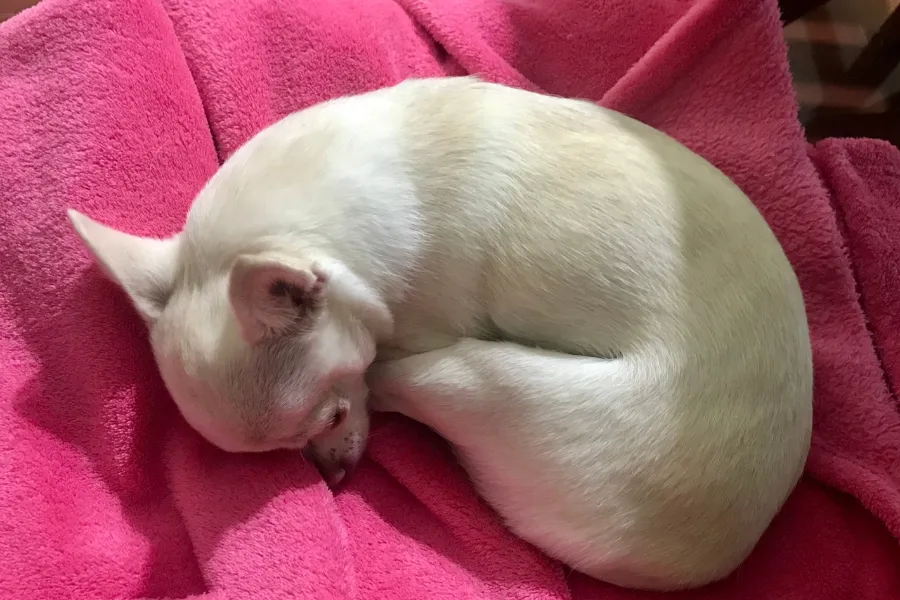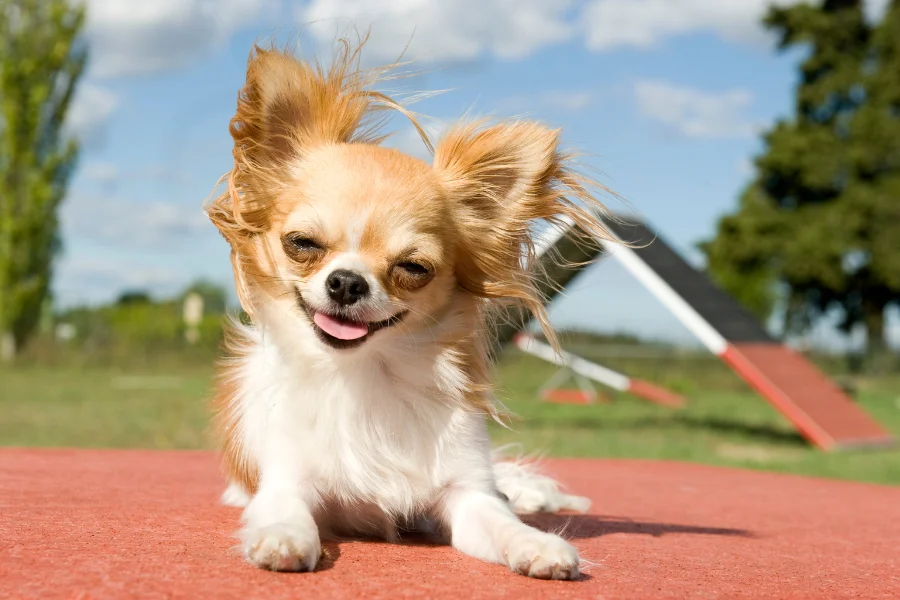Chihuahuas are known for their tiny size and loyal, energetic temperaments. It’s common to see them shivering, but why do Chihuahuas shake so much? There could be several explanations for this behavior, from cold temperatures to anxiety or hypoglycemia.
Knowing the underlying reason behind a dog’s shaking can help pet owners address the issue properly.
Common Reasons Why Chihuahuas Shake
Chihuahuas may shake or tremble due to temperature regulation, anxiety and nervousness, illness or injury, and excitement and attention-seeking.
Temperature Regulation
Chihuahuas have a unique ability among dog breeds to shiver or shake in order to regulate their body temperature. Other small animals, including humans, share this trait.
With their high metabolism and smaller size, Chihuahuas have difficulty regulating their internal temperature and can easily become too cold or hot. In this case, they will start trembling in an effort to warm up or cool down.
As such, the most common cause of shaking in a Chihuahua is due to being cold; the more intense the chill around them becomes, the more likely it is for them to start shaking as a natural reflexive response that helps preserve heat within their bodies.

Anxiety And Nervousness
Chihuahuas, like other dogs, can experience a range of anxieties and fears that may cause them to shake or shiver. Common triggers for anxiety include being left alone for long periods, changes in routine, fear-inducing encounters or experiences with other animals (especially larger breeds), loud noises or crowds, and new environments.
Symptoms may include whining, trembling when taken out on walks, paw lifting while walking away from the owner’s sightline, and hiding under a bed/furniture article when stressed or scared.
To help manage stress levels in Chihuahuas, it is important to provide stability and structure to their routine and proper socialization with people and other animals (with appropriate supervision).
Additionally, exploring natural remedies such as introducing oat straw extract into their diet could be beneficial; there are also medications available through veterinary guidance if needed.
Illness Or Injury
Chihuahuas may shake due to various illnesses or injuries, such as generalized trauma, poisoning, kidney disease, injury, and allergies. Injured Chihuahuas may shake uncontrollably due to shock and pain from the trauma, including broken bones or even near-drowning.
Dog poisoning is also a common cause of shaking; if a particular venom has been injected into their system by parasites like ticks or wasps, then the resulting tremors can be quite disconcerting for owners! Allergies in dogs can manifest themselves through various symptoms, including shivering and itchy skin. These allergic reactions need not necessarily involve physical contact with an allergen either: inhalation and consumption are just as viable ways for allergies to enter your pup’s bloodstream.
Lastly, some instances of kidney disease may cause Chihuahuas to suffer continuous tremors until treated properly by veterinary professionals. Though shocking on its terms, identifying what’s causing your pet’s shakes can help dramatically reduce anxiety while helping ensure they get proper care or treatment when needed.

Excitement And Attention-Seeking
Chihuahuas may shake due to excitement or attention-seeking behavior. It is common for these small dogs to become overly excited when they anticipate spending time with their owners, whether that be cuddles, food, going outside to play, or a special treat.
The unwavering love and devotion of Chihuahuas make them prone to seeking out the attention of their trusted humans — sometimes at all costs! To get the attention they desire, some Chihuahuas may begin shaking as a way of signaling that they want affection.
Redirecting your pup’s hyperactive behavior can help prevent too much shaking associated with excitement. For example, providing stimulating activities such as puzzle toys or interactive chew toys are great mental outlets for your pet’s energy; in addition, physical exercises like fetch or tug will help give them an appropriate release and will decrease the chances that your Chihuahua seeks out other methods (like shaking) for entertainment from you.
How To Comfort A Shaking Chihuahua
If you see your chihuahua shaking, provide it with a comfortable, warm environment, and addressing any potential health issues can go a long way in helping to stop the shaking.
Ensure Warmth And Comfort
Chihuahuas are among the smallest dog breeds with correspondingly high metabolisms that can lead to shivering due to cold temperatures. To ensure warmth and comfort for your new furry friend, clothing such as sweaters or warm blankets should always be on hand to provide additional insulation against extreme weather conditions.
Adding a heating pad or curry comb under their bedding may also help them feel cozy and snug during colder months. You must monitor their behavior, too, as shaking could indicate they’re unwell or in pain from injury.
If you notice any unusual temperature changes, take them to the vet immediately, as this could point towards hypothermia or serious illness that needs veterinary care immediately.

Address Underlying Health Issues
In some cases, shaking in Chihuahuas can result from underlying health issues. Pain, arthritis, and neurological conditions such as hydrocephalus or spinal discs pressing on the nerves can all cause an increase in the intensity and frequency of shakes.
To diagnose these issues accurately, it’s important for your veterinarian to conduct a physical check-up. An X-ray may also be recommended if the vet suspects joint or skeletal problems like arthritis.
Depending on the diagnosis made by your vet, different treatments might include special diets and supplements; pain relief prescribed medications; physiotherapy; or even surgery if the issue is severe enough.
Owners need to monitor their Chihuahua’s behavior closely and look for signs that could indicate an underlying health problem, such as sudden changes in energy levels and more frequent shivering than usual – especially during cold weather when nervousness should occur not be causing any additional trembling.
If you’re concerned about your chihuahuas’ well-being, make sure you seek professional veterinary advice so that appropriate treatment options can be discussed with them.
Manage Anxiety And Stress
Anxiety and stress can be significant causes of shaking in Chihuahuas. To help manage anxiety, providing them with a comfortable, secure environment is important. This could mean blocking off loud or unfamiliar noises, introducing calming aides like pheromone sprays and diffusers, providing plenty of exercise opportunities that challenge the dog mentally and physically, introducing playtime activities that engage the dog but don’t excessively stress them out, and ensuring there are enough outlets for energy release—a stimulated pup is far less likely to become anxious than one who has little to do all day long.
Conclusion
Chihuahuas may shake due to various reasons, some of which are natural and normal, while others may require the attention of a veterinarian. Common causes for Chihuahuas shaking include temperature regulation, anxiety and nervousness, illnesses or injuries, and even excitement seeking.
Owners should always pay close attention to their Chihuahua’s behavior so they will be able to distinguish between healthy shaking from abnormal nervous trembling. Various measures can also be taken, such as ensuring warmth, managing stress/anxiety levels, and addressing any underlying health issues that could be causing the tremors or shivering in order to provide comfort for your pet Chihuahua.
General Facts
- Chihuahua is shaking out of a combination of excitement and enjoyment from being stimulated.
- The breed’s naturally high metabolism may also cause shaking.
- Chihuahuas’ tendency to be sensitive to low temperatures means they may shiver and shake when it’s cold.
- When they have excess energy, it’s common for Chihuahuas to shake.
- Hypoglycemia or abnormally low blood sugar is typically the reason for shaking in Chihuahuas.
- In addition to poisoning and other causes of trembling in dogs is anxiety.
- It is common for Chihuahuas to shake, and people mistakenly interpret it as a sign of illness.
- Chihuahuas tend to shake mainly when there is a valid reason.
- The fact is that not all Chihuahuas are shaky and nervous, despite what people may think.
- In addition to this search query on Chihuahuas biting, you can look into other topics, such as their barking, sleeping, crying, and burrowing.
Facts about – Temperature Regulation, Reasons for Chihuahuas Shaking
- Shivering or shaking is a normal body function that aids temperature regulation in Chihuahuas, people, and other animals.
- Chihuahuas have difficulty regulating their body temperature, which can cause shivering as a side effect.
- Shaking is a natural way dogs regulate their temperature, and when Chihuahuas start to shiver, it’s usually because they’re cold.
- Chihuahuas have a super-fast metabolism, which is one of the main reasons they get cold easily.
- Sometimes, excess energy, anxiety, low blood sugar, seizure, poisoning, or various diseases can also cause shivering in Chihuahuas.
Facts about -Illness or Injury, Reasons for Chihuahuas Shaking
- Generalized trauma, poisoning, kidney disease, injury, or allergies can cause Chihuahuas to shake.
- When a Chihuahua is moderately to severely injured, it may shake uncontrollably due to the shock of trauma and/or pain.
- Shaking could be due to dog poisoning or an allergy, illness, or injury.
- Chihuahuas may shake because of their naturally high metabolism or cold weather.
- Chihuahuas need to be in a warm place since they do not have much hair or body fat to protect them from the cold.
